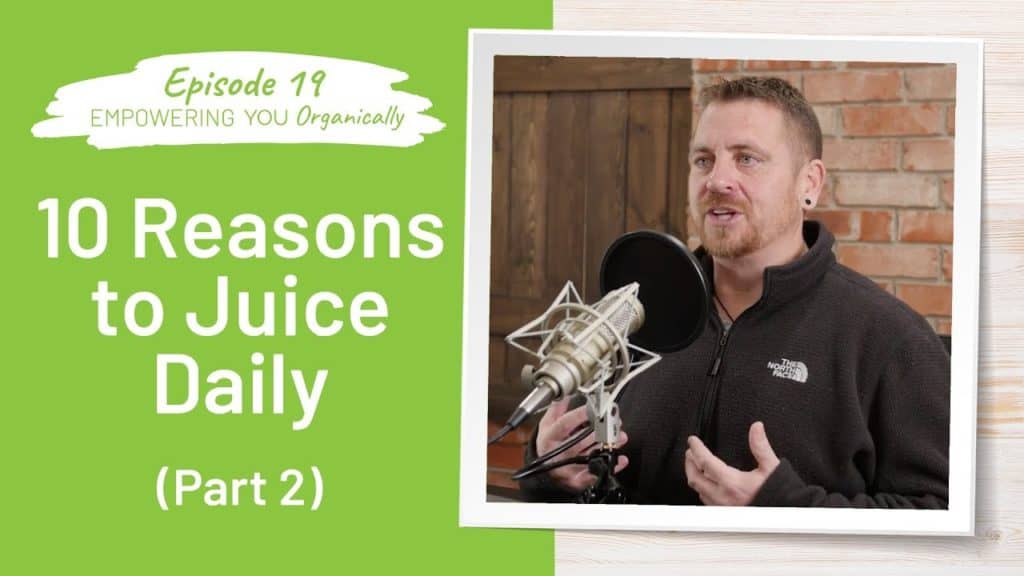Empowering you Organically – Season 3 – Episode 19
Title: 10 Reasons to Drink Juice Daily – Part 2
Hosts: Jonathan Hunsaker & TeriAnn Trevenen
Guest: N/A
Description: Is juicing the fountain of youth hiding in plain sight?!? We continue the top 10 reasons you, not should, but want to be consuming green juice every day. Jonathan and TeriAnn also tell us what we should look for in a green superfood as a replacement for the days you just can’t get the juicer running. What are the differences between juices and smoothies? We weigh in on the topic this week. You really want to listen to this episode and hear the #1 reason to drink your green juice. It will surprise you, guaranteed!
* * *
What is Juicing?
- process of extracting juice from plant tissues such as fruit or vegetables
- generally the preferred method of consuming large amounts of produce quickly
- often practiced for dietary reasons or as a form of alternative medicine
Top 10 Countdown on Juicing
- Liquids
- We need liquids to remain healthy, and juicing is a good source of liquids. Around three-quarters of the human body is water.
- There is general agreement among clinicians that chronic mild fluid restriction will compromise health, but there is limited solid evidence to substantiate this clinical impression.
- Severe dehydration is clearly detrimental to health, and is associated with compromised cardiovascular function, renal impairment, weakness and lassitude, and a number of diffuse symptoms, including headache, nausea and general malaise.
- Specific Vitamins and Minerals
- When you juice raw fruits and vegetables, you get specific vitamins and minerals in a natural, easily absorbable form.
- Looking for beta carotene? Drink carrot juice.
- Looking for potassium? Try a green juice, or blackberry juice.
- Phytochemicals
- Plant-based foods, such as fruit, vegetables, and whole grains, which contain significant amounts of bioactive phytochemicals, may provide desirable health benefits beyond basic nutrition to reduce the risk of chronic diseases.
- Protein from Non Meat Sources
- Although fruits and vegetables do not contain large quantities of protein, their juice can be a convenient carrier.
- Simply add some brewer’s yeast, wheat germ, or collagen to whatever you’re juicing. These give you protein without the fat that meat contains, and protein that is quickly and easily absorbed by the body.
- Quick Absorption
- When you drink juice, the nutrients get to you quickly. Nutrition at the cellular level!
- Less Digestive Work
- When you drink juice, you save your body energy; it doesn’t have to do as much digesting.
- It also helps maintain your supply of digestive enzymes… you do not use as many.
- Healthy Sugar
- Juices contain simple sugars that we need for energy; however, because they are combined with other healthful nutrients, they are not harmful, as are refined sugars.
- The Complete Package
- When you juice, you get the whole package…all the nutrients found in fruits and vegetables. this means natural nutrients in natural proportions, not added sugars, like those found in juices on supermarket shelves.
- Juicing Prevents Disease
- Many studies point out that a diet high in fruits and vegetables can prevent disease.
- Some of the most exciting research in the last decade has been the discovery of a group of nutrients, which have protective effects against cell oxidation. These naturally occurring compounds impart bright colour to fruits and vegetables and act as antioxidants in the body by scavenging harmful free radicals, which are implicated in most degenerative diseases.
- Epidemiological studies have established a positive correlation between the intake of fruits and vegetables and prevention of diseases like atherosclerosis, cancer, diabetes, arthritis and also ageing. So pronounced has been their effect on ageing that they have been called ‘fountains of youth’.
- Fruits and vegetables have thus had conferred on them the status of ‘functional foods’, capable of promoting good health and preventing or alleviating diseases.
- Phenolic flavonoids, lycopene, carotenoids and glucosinolates are among the most thoroughly studied antioxidants.
- Enzymes!
- Fruit and vegetable juices provide a convenient source of enzymes.
- They spark the essential chemical reactions we need to live.
- They are necessary for digesting food, for stimulating the brain, for providing cellular energy, and for repairing all tissue.
Tips for Juicing
- Get a good juicer that is easy to clean
- Make juice for a couple days at a time
- Only use organic fruits and vegetables
What is a Green Superfood Powder and Why Do I Want One?
A green superfood powder contain many servings of vegetables and superfoods in a scoop of water-soluble powder. In addition to veggies and superfoods, the powder may also contain other health-supporting ingredients like probiotics and immune-supporting herbs.
- Depleted soil with less minerals and good bacteria
- Reduced food diversity and wild varieties
- Reduced nutrient density in vegetables
- Modern lifestyle depletes vitamins and minerals
What to Look For in a Green Superfood
https://ox2022.organixx.com/organic-organigreens/
- USDA Certified Organic
- Must have at least 50 ingredients
- A green drink with at least 50 ingredients will do a better job of filling those “nutritional gaps” than a green drink that has only 20 ingredients.
- Use advanced processing techniques: Pulp Powder vs Juice Powder
- Whereas “pulp powders” require 5-6 lbs of greens to create 1 lb of green drink powder, “juice powders” require as much as 33 lbs!
- Must contain all 5 “Nutritional Boosters”
- Fruit, Vegetables (including GREENS), Mushrooms, Herbs, Spices
- MUST taste good! If it tastes good you will stick with the habit!
* * *
Subscribe to Empowering You Organically
Never miss an episode!
APPLE PODCASTS SPOTIFY GOOGLE PODCASTS
–
Episode 19 – 10 Reasons to Drink Juice Daily – Part 2





